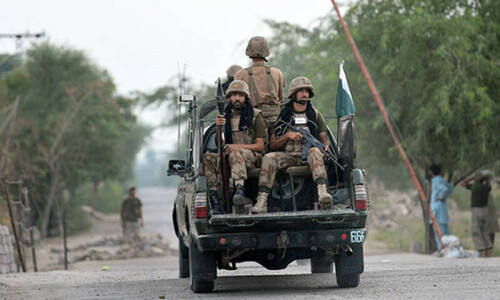MILITARY personnel as well as police officers have come under militant attack in three provinces over the last few days, resulting in the martyrdom of several individuals. The deadliest attack was in Gwadar, where 14 troops were martyred, while terrorists launched a brazen attack on a PAF base in Mianwali. Attacks also took place in Dera Ismail Khan and Lakki Marwat.
The latest attack came yesterday; leaving four army men martyred in Khyber. While a group allied with the banned TTP has claimed responsibility for the Mianwali attack, a separatist Baloch outfit said it was behind the Gwadar atrocity. Whereas security men have been the principal targets of the latest violence, the perpetrators belong to differing ideological strands, indicating the complexity of the threat matrix confronting Pakistan.
Talking to the media on Sunday, the Balochistan caretaker information minister claimed “two neighbours” are responsible for “blackmailing” Pakistan through terrorism.
The minister’s fingers were pointed towards India and Afghanistan. Indeed, the possibility of foreign actors’ involvement cannot be discounted; in the past, there has been evidence enough of the threat posed by such hostile actors, especially when agents working for external intelligence agencies have been apprehended.
In this respect, the hostility with India is decades old. Pakistan’s relations with Afghanistan were hardly cordial before the Afghan Taliban took Kabul in 2021.
It was expected that ties would improve after the group’s victory, but things have not transpired according to this script. The Taliban have done little to rein in the banned TTP, which is using Afghan soil for launching attacks against Pakistan.
Moreover, the repatriation of Afghan nationals has also managed to take away whatever remaining goodwill there might have been between Islamabad and Kabul. Yet the fact remains that even if malign foreign actors are fuelling instability inside Pakistan, it is the responsibility of the state to counter these moves, and protect the lives of security personnel and civilians.
The recent attacks point to intelligence failures, as terrorists were able to target security men in significant numbers, along with raiding the PAF base, which is supposed to be a highly secure facility.
While there may not be evidence of this in the recent violent episodes, security agencies must probe the possibility of insider information being passed on to militants, as there are precedents of this happening during past terrorist attacks.
Frank questions must be asked within the security establishment to assess what loopholes are allowing terrorists to target our forces. This cycle of spasms of violence followed by uneasy calm must be broken.
For this, the security apparatus must give full attention to vanquishing the terrorist threat and neutralising the militants’ support network, instead of indulging in activities that are beyond its brief.
Published in Dawn, November 7th, 2023














































Dear visitor, the comments section is undergoing an overhaul and will return soon.